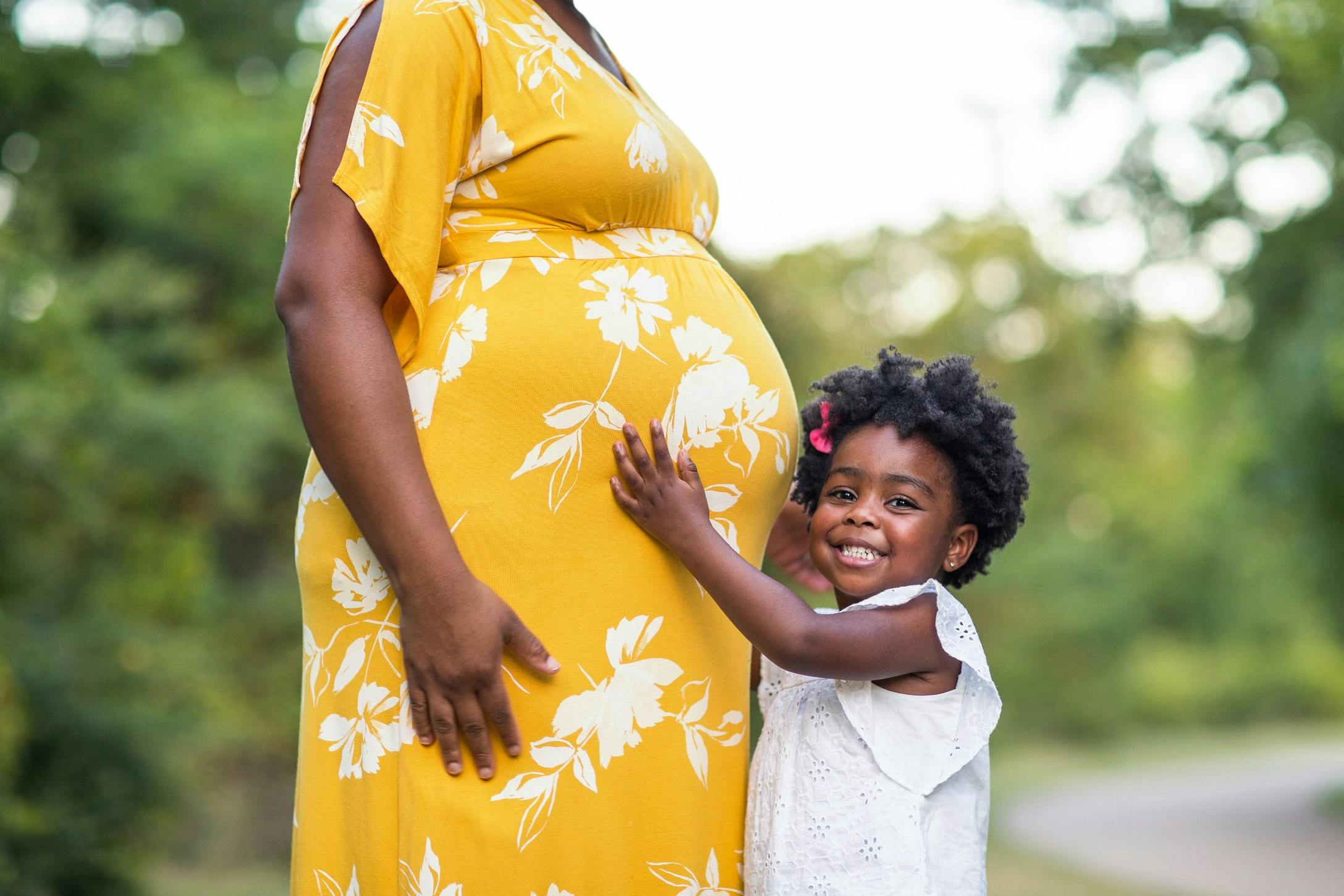Losing Weight After Pregnancy
Discover how fast new moms should try and 'bounce back' to their pre-pregnancy weight, get insights into what may hold them back, and discover tips about how to overcome the weight loss obstacle.
•
Updated11/19/2024
•

Growing, birthing, and caring for a baby is no joke. And while the medical community recommends new moms return to their pre-pregnancy BMI within the first 12 months, achieving a healthy weight post-baby can be a struggle.
The stress level of caring for a newborn, adjusting to a new routine, shifting relationships, and recovering from childbirth is a lot. And, it’s not uncommon for moms to struggle dropping those excess pounds.
However, returning to a healthy weight after pregnancy is important to both long-term health and having more children.
Show Yourself Grace
Before we jump into pregnancy weight gain and how to lose weight after a baby, it’s important to remember to show yourself some grace. Your body did an amazing thing. And gaining weight while you’re pregnant is completely natural.
‘Bouncing back’ to your pre-baby figure in just a few weeks isn’t typical. It’s not expected. And, it’s not the natural course of things. Losing weight after pregnancy can take some time, and that’s 100% okay.

It is not only natural, it is important to gain weight while pregnant.
Pregnancy Weight Gain
It doesn’t matter how you slice it, gaining weight during your pregnancy is normal. It’s expected. It’s important. But it’s also important to understand how much weight you should gain.
While we’re not always fans of the body mass index (BMI), it can help provide some rough guidelines for how much weight an expecting mom should put on. According to the Center for Disease Control and Prevention (CDC), the following outlines weight gain recommendations for women pregnant with one baby:
- Underweight (BMI less than 18.5) — 28 - 40 pounds
- Normal Weight (BMI 18.5 - 24.9) — 25 - 35 pounds
- Overweight (BMI 25 - 29) — 15 - 20 pounds
- Obese (BMI greater than or equal to 30) — 11 - 20 pounds
While these numbers may seem big (or small) depending on your situation, it’s important to understand what those extra pounds represent. Because the weight you’re putting on serves a purpose. It’s not just the baby you’re growing, it’s all the things needed to grow the baby and care for it after.
The following is a rough estimate. These numbers can (and certainly do) change from woman to woman, and pregnancy to pregnancy. Also note, these numbers represent a woman carrying one child.
- Uterus Growth: 2 - 5 pounds
- Fat Stores: 5 - 9 pounds
- Breast Tissue: 2 - 3 bounds
- Amniotic Fluid: 2 - 3 pounds
- Placenta: 2 - 3 pounds
- Baby: 8 pounds
Popular Health Tips
While staying within a healthy range of pregnancy weight gain will make it easier to shed the weight after birth, it’s also important for your baby’s health. A 2007 study called ‘Project Viva’ was conducted in the Boston-area. It followed 2,000 pregnant women and their offspring, tracking the mothers’ pregnancy weight gain and the children’s weight at the age of 3.
The study found that children of women who gained an ‘excessive’ amount of weight were four times more likely to be overweight at the age of three. This excessive weight in children predisposes them to some serious health concerns — namely obesity.
In the 2017 study, ‘Simulation of Growth Trajectories of Childhood Obesity into Adulthood,’ published in The New England Journal of Medicine research indicated that the relative risk of adult obesity increased with age and BMI. Or to put it more plainly, the heavier a child is at a young age the more likely they will be overweight as an adult.

Don't be afraid to take it slow. Losing weight is not a sprint, it's a marathon of life. Take it one day at a time and show yourself some grace.
Losing Weight After the Baby Arrives
You had a baby. Jumping on a diet bandwagon the moment you get home is likely the last thing on your mind. For the first month, just focus on healing and cuddling your sweet little one.
Plus, you’ll see some immediate weight loss simply by giving birth. This includes the weight of:
- The Baby
- The Placenta
- The Amniotic Fluid
As you get settled into your routine after the first month, start taking stock of your eating habits. Going on an ultra-restrictive diet isn’t recommended for new moms — especially if you’re breastfeeding. You need those calories to heal and produce milk.
What you want to stay away from is the unhealthy calories. Processed foods, excessive amounts of sugar, and foods high in fat are common culprits of weight gain. They make it difficult to lose weight. And, they can introduce harmful chemicals to your baby through your breast milk.
Stick to a diet of lean proteins, hearty vegetables, and complex carbs. Finding that your sweet tooth is really getting the best of you? Try and look for healthier alternatives. (We’re big fans of No-Bake Paleo-Vegan Cookie Dough Bars!)

Walking is one of the best ways to start getting back in shape. Make it more fun by inviting fellow new moms to join you!
Should You Workout After Having a Baby
Physical activity after pregnancy offers a myriad of benefits, including:
- Strengthening and toning abdominal muscles
- Boosting energy
- Can help prevent postpartum depression
- Promoting better sleep
- Relieving stress
- Promoting weight loss
According to the The American College of Obstetricians and Gynecologists, women with a healthy pregnancy and normal vaginal birth may begin exercising within a few days after having a baby.
That being said, it’s always best to consult your doctor about when you can resume physical activity and how much activity you should be doing. Generally speaking, it’s best to start with a slow-paced walk on a flat surface.
I’ve Been Trying to Lose My Baby Weight and Nothing Works
If you feel like losing weight after having a baby is an uphill battle, you are not alone. The desire to lose weight is a common trend. Roughly half of Americans report trying to lose weight.
But the struggle to shed those pounds and keep them off is very real. Daniel Engber’s 2020 article “Unexpected Clues Emerge About Why Diets Fail” published in Scientific America dives deep into the battle.
Research suggests that roughly 80%of people who shed a significant portion of their body fat will not maintain that degree of weight loss for 12 months; and, according to one meta-analysis of intervention studies, dieters regain, on average, more than half of what they lose within two years.
Furthermore, new moms face some of the biggest battles with weight loss. Not only is it commonly difficult to lose weight after a baby, but research also shows it’s common to gain weight. A 2016 study, “Postpartum Weight Retention Risk Factors and Relationship to Obesity at One Year,” evaluated 774 postpartum for 12 months. It found that approximately 75% of the women were heavier one year after giving birth than they were while pregnant.
Trying to lose weight without a support system is exponentially more difficult. At Premier Integrative, our naturopathic doctors provide medically supervised weight loss services to help you shed the pounds and keep them off for good. This is not a one-size-fits-all program.
Medically supervised weight loss is customized to your unique health needs and lifestyle. We help you get the guidance and tools you need to make sustainable changes to your overall wellbeing.






